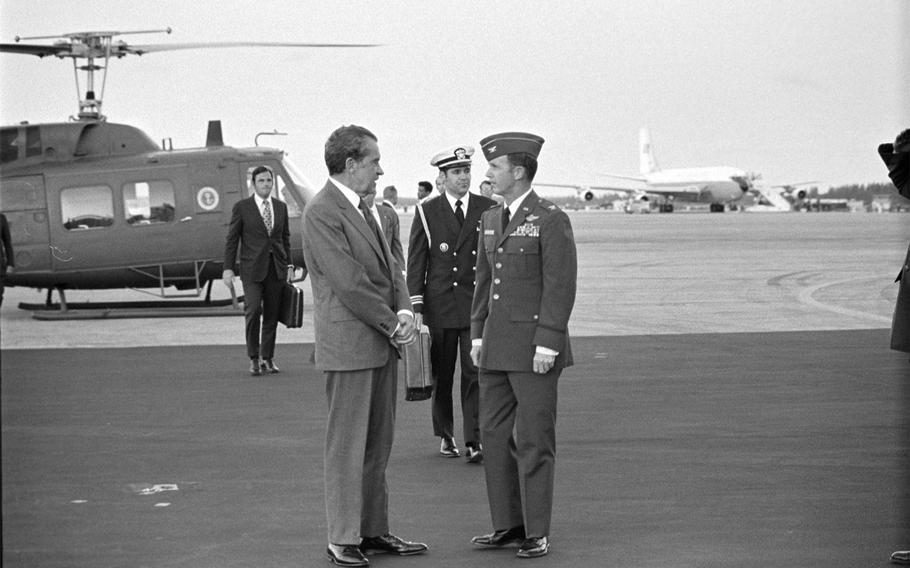
In this photo obtained by the National Security Archive from the Richard M. Nixon Presidential Library, Nixon speaks with senior Air Force officers, with Presidential Emergency Satchel carrier Lt. Cmdr. T. Stephen Todd in the immediate background, at Homestead Air Force Base, Fla., on March 11, 1974. (Richard M. Nixon Presidential Library/National Security Archive)
This month marks a half-century since President Richard M. Nixon resigned from office, so far the only chief executive officer of the United States to do so. As this indicates, his long career encompassed great failure, but he also enjoyed great triumphs.
Nixon’s successes include important but rarely-mentioned 1957 civil rights legislation, the first since the Civil War era and a priority of the Eisenhower administration. The law created the Civil Rights Section of the U.S. Justice Department and empowered federal prosecutors to enforce voting rights.
While powerful Southern Democrats in Congress weakened the final act, nonetheless a firm initial foundation was created for the historic civil rights and voting rights laws of 1964 and 1965.
As president, Nixon created the Environmental Protection Agency. One significant public spur was the dramatic, extraordinary incineration of debris and pollution in the Cuyahoga River in Cleveland in 1969, the year Nixon was inaugurated.
The fire lasted less than a half hour, resulted in damage to railroad bridges but no injury to people. Nonetheless, the media and political reverberations were tremendous.
Foreign policy was Nixon’s professional passion, and his accomplishments were truly historic. Long U.S. involvement in Vietnam ended. The SALT I treaties with the Soviet Union stabilized the arms race. The opening to China mitigated strategic costs of communist victory in Vietnam. Fixed currency exchange rates were ended, reflecting new realities. These and other policy successes are of lasting importance.
Of particular importance regarding our Army and other services is the ending of the military draft. This was the first peacetime conscription in U.S. history, and became exceptionally controversial during the Vietnam War. The all-volunteer military has been a success, but also has resulted in new separation between the services and wider American society.
Nixon speechwriter Pat Buchanan, an influential author and activist in earlier decades, has remarked that in effect his boss forgot more about foreign policy than Donald Trump will ever know.
Buchanan deserves serious attention. He spearheaded insurgent nationalism in the Republican Party in 1992 and 1996, and was the Reform Party candidate for president in 2000. He influenced the final election outcome, and is a link joining the Nixon and Trump eras.
Nixon’s road was never easy. Sometimes self-defeating ways were combined with remarkable effectiveness. Though newly elected to the Senate, he became Dwight Eisenhower’s 1952 running mate by positioning himself as a bridge between isolationist and internationalist wings of the Republican Party.
The youthful new 39-year-old vice president began to work relentlessly to build grass-roots support and a reputation for expertise. In 1960, Eastern upper-class backers of Ike bet on Nelson Rockefeller as Republican presidential nominee.
Nixon outmaneuvered the powerful financial and industrial interests, helped crucially by grass-roots Republicans. He worked constantly, relentlessly to cultivate that base.
He redefined and greatly elevated the importance of the office of vice president. In so doing, he greatly strengthened American government, especially given that vice presidents tend to become president.
Nixon also deserves credit for debating John F. Kennedy in the 1960 presidential contest. Kennedy privately credited those debates as crucial to his election. Presidential candidate debates are now a campaign staple, thanks to President Gerald Ford’s generous willingness in 1976 to build on the 1960 precedent.
Nixon in retirement met with aspiring young Republicans. When asked about controversy, he emphasized that could be helpful. Worry instead about being boring. Once voters lose interest, you’re finished.
Richard Nixon’s legacy is enormous, and evolving. Watergate, the crisis generated by criminal acts tied to the White House, ended his presidency. That capped a grotesque, violent decade, important to understanding.
As those terrible times fade, Nixon’s enduring policy achievements will become more visible. Related and important is his and wife Pat’s successful family.
Arthur I. Cyr is author of “After the Cold War — American Foreign Policy, Europe and Asia.”